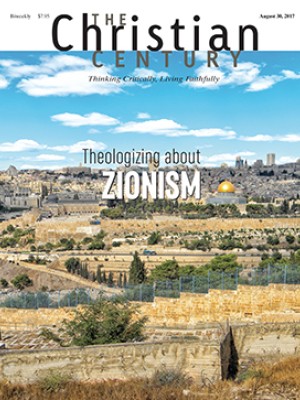To preserve Jewish heritage, Egypt plans to restore Alexandria synagogue
The push is in line with President Abdel-Fattah el-Sissi’s attempts to emphasize Egypt’s diversity in response to attacks on minority groups.
A $2 million restoration of Egypt’s largest synagogue, Prophet Elijah Synagogue in Alexandria, is the start of a government effort to keep Jewish heritage alive.
“The government is elevating the profile of the heritage of Egyptian Jews,” said Samy Ibrahim, vice president of the Cairo Jewish community, which, like the one in Alexandria, counts a population of less than a dozen members.
The Jewish community numbered 75,000 when the first Arab-Israeli war broke out in 1948. Since then, most members have left for Israel, France, and elsewhere.
Ibrahim and other Egyptian Jewish leaders met recently with Joshua Shamsi, a Connecticut-based photographer, at the synagogue in Alexandria to draw up plans for a comprehensive visual survey of their synagogues, schools, and cemeteries.
“Something important is happening in Egypt,” said Shamsi, who has documented heritage sites in Morocco, Tunisia, and Iraq for Diarna, an online “geo-museum” of Middle Eastern Jewish life. “Doors closed before are now opening.”
Khaled El-Enany, minister of antiquities, said his agency plans to fund the restoration of the 700-seat Italianate synagogue. The sanctuary in the 160-year-old structure was restored to 1850s style after being damaged when French forces bombarded the Mediterranean port city. Egyptian King Muhammad Sa’id Pasha paid for the work at the time.
The resoration efforts are in line with Egyptian president Abdel Fattah el-Sisi’s attempts to court Coptic Christians and emphasize Egypt’s religious diversity in response to a series of deadly bombings in minority communities, mostly by the Islamic State group.
Read our latest issue or browse back issues.
The efforts with Jewish Egyptians show el-Sisi is serious about promoting religious diversity, Ibrahim said, even as human rights groups accuse authorities of cracking down on civil society in other spheres of life.
“This is part of Egypt’s national heritage, and what we are doing is encouraging understanding among religions and respect of the other,” he said.
Some supporters of the Muslim Brotherhood have denounced the Alexandria synagogue restoration and accused el-Sisi of taking money from Israeli and American Jewish donors.
In fact, Egypt has rebuffed Israeli efforts to fund the restoration of Jewish heritage sites. Even though Israel and Egypt formally signed a peace accord in 1979, relations have remained cool. But Cairo has engaged with U.S. government officials and Jewish American organizations concerned with the preservation of synagogues and cemeteries and allowed them to fund Egyptian groups. The United States has also partnered with the government of Egypt on preserving mosques and churches.
“Cairo has made some intelligent moves recently,” said Roger Bilboul, a Jewish native of Alexandria who advocates for the community’s interests from France. “They have organized a charity to look after the Jewish heritage in Egypt and the members of the board of that charity don’t have to necessarily be Jews. They are cultivating a support network to maintain the sites and an interest in our culture, even after the last member of the Jewish community passes away.”
Among the groups receiving American money was Drop of Milk, a registered nonprofit cofounded by Ibrahim and Cairo Jewish community president Magda Haroun. The group aims to maintain synagogues with the goal of opening them as arts and community centers for all Egyptians.
Jewish American groups working in Egypt said it took time to launch the effort.
“The Egyptians made it clear that they were not interested in a formal partnership with global Jewish groups,” said Andrew Baker, international Jewish affairs director at the American Jewish Committee.
Baker has visited Egypt six times over the past decade to meet with local Jewish leaders and with government officials, who eventually agreed to release public funding and welcome indirect help for the work.
“The attention these efforts brought to the subject led Egyptian authorities to a position that claimed Jewish sites as Egyptian heritage and to say, ‘We will do these things ourselves,’” Baker said. “That’s a good outcome.” —Religion News Service
A version of this article, which was edited on August 11, appears in the August 30 print edition under the title “To promote diversity, Egypt plans to restore Alexandria synagogue.”






